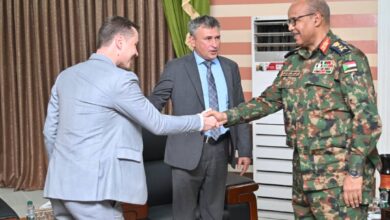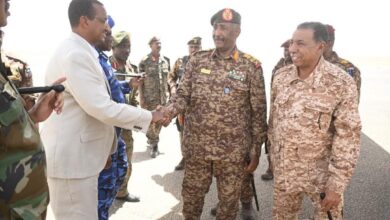
The European Union and the war in Sudan: Adopting Alternate Narratives Promotes Terrorism and Anarchy
Ali Al-Sadiq Ali,
Minister of Foreign Affairs of the Republic of the Sudan
Monday, April 15th, 2024
On Monday, April 8, I read an Op-Ed about the current situation in Sudan jointly written by Mr. Josep Borrell Fontelles, High Representative of the European Union for Foreign Affairs and Security Policy and Vice-President of the European Commission and Mr. Janez Lenarčič, European Union Commissioner for Crisis Management.
First and foremost, I appreciate the high-ranking European officials’ interest in what is going on in my country and their concern about the current humanitarian challenges in Sudan. The first step, however, in effectively addressing any problem is to accurately comprehend and describe the problem before seeking to resolve it. The Op-Ed made it abundantly obvious to me that its foundation rested upon an erroneous interpretation of the crisis as well as misleading presumptions that undermined the OP-Ed’s objectivity and fairness. Should this interpretation prevail, the crisis in Sudan will be further exacerbated and human suffering will increase.
Alternative narratives:
The adage goes that the truth is invariably the first casualty of wars. This is due to the distorted alternative narratives spread by those driving the conflict. Whether purposefully or unintentionally, the Op-Ed’s authors fell into this trap. The authors blamed the outbreak of war a year ago on what they dubbed a coordinated military coup in October 2021. Nothing could be further from the truth than this claim! The measures of October 25, 2021, came at the height of a political crisis that struck the Forces of Freedom and Change coalition (FFC), which represented the civilian side in the civil-military partnership established by the Constitutional Document of August 17, 2019, that had subsequently formed two transitional cabinets in September 2019 and February 2021 respectively. The FFC experienced a series of fractures and divisions, resulting in three opposing blocs, amid mutual accusations of violating the Constitutional Document, betraying the revolution’s ideals, and abandoning the Juba Peace Agreement (JPA) of October 2020. That crisis disrupted the Transitional Government, as well as the economy and most aspects of normal daily life in the country, due to sit-ins and the closure of public roads, including the land route between Sudan and Egypt, the road to Port Sudan, and the Port itself, which are the lifeline of the nation’s economy. As a result, the October 2021 measures were an attempt to get out of this intractable crisis, particularly after three unsuccessful bids by the transitional Prime Minister to resolve it. Those measures were fully supported by one of the two main FFC blocs, namely the armed movement’s signatories to the Juba Peace Agreement (JPA). Nevertheless, the October 2021 measures ended with the agreement reached between the military side and the transitional Prime Minister on November 30, 2021. The latter resumed his responsibilities thereafter. A month later, however, he tendered his resignation due to his inability to reconcile the divergent factions’ views within FFC. Thus, in what way can the conflict that transpired on April 15, 2023 be linked to the events of October 2021?
The actual causes of conflict:
The war’s underlying causes can be attributed to the determination of both internal and external actors to sustain the disbanded rebellious Rapid Support Forces (RSF) and bolster them to function as a parallel military force to the professional National Army, in alliance with certain political groupings, who are seeking a monopoly of power throughout a protracted transitional period. Regrettably, the United Nations Integrated Transition Assistance Mission in Sudan (UNITAMS) followed through with this strategy.
The Sudanese Armed Forces and political parties signed a framework agreement to restore civilian rule on December 2, 2022, in the hope that this will facilitate the Rapid Support Forces’ integration into the National Army within a reasonable timeframe. This integration would have granted the state the power and responsibility to defend the security, unity and territorial integrity of the country. The counter-plan, on the other hand, sought to establish the dissident RSF militia as a ruthless military force autonomous from the Armed Forces Command, bolstered by a vast economic empire and substantial regional backing. Upon the rejection of this plan by the Sudanese Armed Forces leadership, the RSF and its regional sponsors initiated this conflict with the intention of forcibly seizing power. When it failed, the RSF turned its guns to the civilian population.
The external sponsors:
To further their sinister design, the regional sponsors of the rebel militia have also recruited criminals released from prisons by the RSF in addition to tens of thousands of foreign mercenaries and tribal militias. The heinous atrocities, such as genocide and ethnic cleansing in West Darfur, widespread sexual violence, and the forced displacement of millions of Sudanese residing in the capital city and the states of Gezira, Darfur, White Nile, and Kordofan, were executed with the support of these sponsors, who supplied boundless and uninterrupted supplies of high-quality weapons, including drones.
The Op-Ed authors did indeed make reference to the involvement of external sponsors in the war. They, however, inverted the truth. The primary factor contributing to the ongoing conflict is the United Arab Emirates backing of the terrorist RSF militia. This backing includes all forms of weapons, mercenaries, funding, and political and propaganda support. A look at the final report of (S/2024/69) of the UN Panel of Experts on Darfur as per Security Council Resolution 1591 is sufficient to discern the details of military supplies from the UAE to the militia across the border with Chad, let alone the 122 cargo flights that have been monitored and imaged by satellite from UAE airports to Amdjarass and Abéché airports in Chad as of January of this year. Officials and lawmakers in the United States have widely addressed this, and it has been the subject of extensive coverage in the international media. Despite UAE’s backing to the RSF Militia being the single most significant factor in the war’s continuation, the European Union maintained an entirely mute stance! No wonder, therefore, the two EU officials have been economical towards this truth! Stating only, “The United Arab Emirates have also direct leverage on the RSF that they should use to end the war.” This is absolutely skewed and reckless simplification equivalent to twisting the facts.
The authors’ assertion of an Iranian role in the war is nothing more than a smokescreen. Sudan and Iran do not currently cooperate militarily. Sudan, similar to the overwhelming majority of countries in the region, reestablished diplomatic ties with Iran only recently. Nevertheless, I would like to make it clear that the acquisition of weaponry and equipment necessary for any national army to safeguard the country and its citizens from any threat is both a right and a responsibility sanctioned by all applicable laws and norms.
Apathy in the face of genocide?
The two EU high officials assert that the European Union maintains a “neutral stance” with respect to the “belligerents.” Since the outbreak of the conflict until the end of last year, the rebel Rapid Support Forces militia and allied militias have reportedly slaughtered between ten and fifteen thousand civilians in the city of El Geneina, West Darfur, alone on ethnic grounds, according to the UN Security Council Panel of Experts on Darfur. In December 2023, the United States State Department reached the conclusion that the rebel RSF militia had engaged in ethnic cleansing and crimes against humanity that resemble genocide. Last February, a bipartisan draft resolution has been submitted to the US Congress “Recognizing the actions of RSF that the rebel RSF and its affiliated militias in Darfur against non-Arab ethnic communities as acts of genocide”. Similarly, on August 17, 2023, twenty-five United Nations rapporteurs and experts on Human Rights and Protection of Women and Children alerted to “the brutal and widespread use of rape and sexual violence against women by the RSF, and its detention of hundreds of women, where they are subjected to sexual exploitation, forced labor, and enslavement.” This is corroborated by field surveys by several human rights organizations including, the Strategic Initiative for Women in the Horn of Africa (SAYHA), the African Center for Justice and Peace Studies, and the MASHAD Observatory for Human Rights, among other regional and local human rights organizations .In addition a total of 153 incidents of church attacks were recorded by the Sudanese Council of Churches, which documented the complete destruction of 17 churches committed by the RSF militia. These atrocities, to which the European Union maintained a “neutral stance”, are more egregious than the acts carried out by Boko Haram and the Ugandan LRA, and are comparable in nature to the atrocities committed by ISIS. Should this be approached with neutrality? Is it morally justifiable to preach about human values while remaining neutral towards the party responsible for these crimes?
Promoting terrorism and anarchy:
In addition to its participation in the UN peace operations, the Sudanese Armed Forces, a one hundred years old National Army, contributed to the eradication of Fascism and Nazism by fighting in World War II. Additionally, the Sudanese Army participated in liberating 3 neighboring countries from Fascism, and contributed in establishing the armies of some African and Arab nations following their independence. It is an army made up of professionals who are well-versed in and adhere to International Humanitarian Law and internationally recognized rules of engagement. When this army is placed on an equal basis with a multinational mercenary militia, and given Sudan’s critical geopolitical location, isn’t this an encouragement of the terrorism and anarchy that the Op-Ed warns about?
In conclusion, the Sudanese Government has consistently affirmed that adhering to the principles and outcomes of the Jeddah Platform is the most effective approach to resolve the humanitarian challenge as well as laying the foundations for peace. Of equal importance is the fulfillment of donor pledges made at the International Conference on Humanitarian Aid to Sudan on June 18, 2023 in Geneva. This must be complemented by an imperative that the militia’s regional sponsors, primarily the United Arab Emirates, be compelled to cease its provision of lethal and destructive weaponry and support to the militia which it is employing against the people of Sudan.




